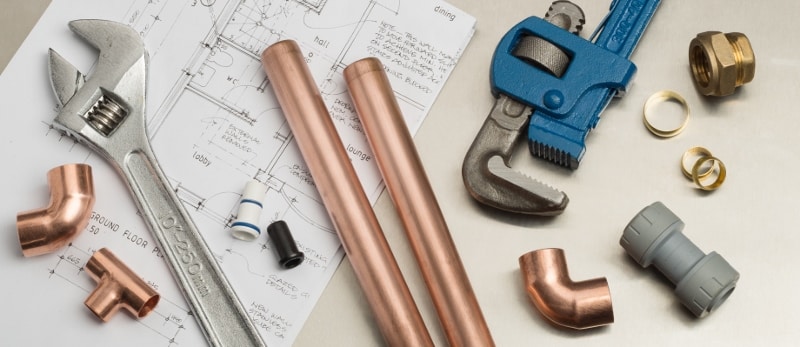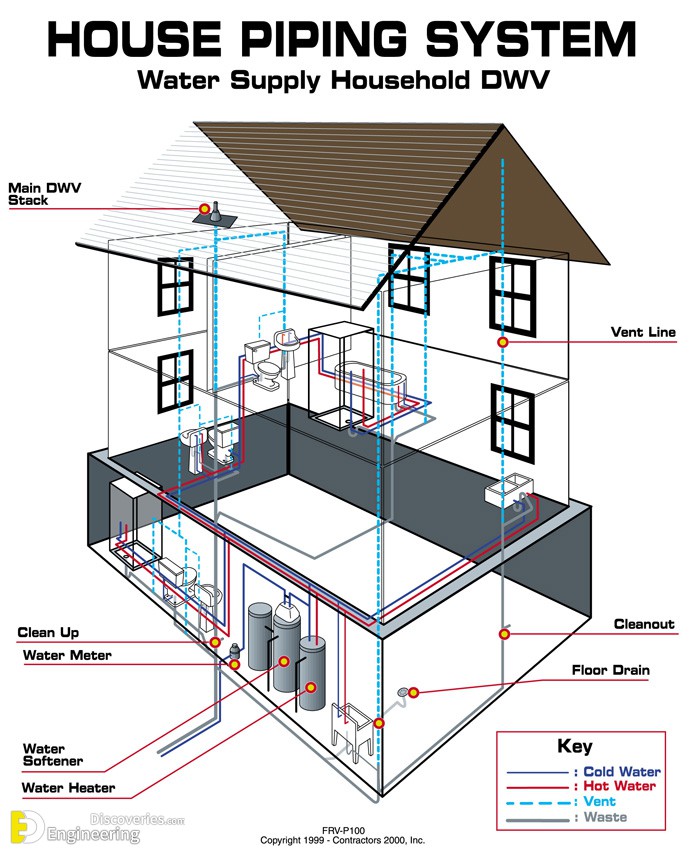Understanding Your Property's Plumbing System Anatomy
Understanding Your Property's Plumbing System Anatomy
Blog Article
Listed here below you'll find a good deal of incredibly good details related to Understanding Your Home's Plumbing Anatomy.

Comprehending just how your home's plumbing system works is necessary for each property owner. From supplying clean water for drinking, cooking, and bathing to safely eliminating wastewater, a well-kept plumbing system is vital for your family members's wellness and comfort. In this comprehensive overview, we'll explore the intricate network that composes your home's pipes and offer suggestions on maintenance, upgrades, and managing common issues.
Introduction
Your home's plumbing system is more than just a network of pipes; it's a complex system that ensures you have access to clean water and efficient wastewater removal. Knowing its parts and just how they collaborate can aid you stop expensive repair work and guarantee everything runs smoothly.
Basic Components of a Pipes System
Pipelines and Tubing
At the heart of your plumbing system are the pipes and tubes that lug water throughout your home. These can be constructed from numerous products such as copper, PVC, or PEX, each with its advantages in terms of resilience and cost-effectiveness.
Components: Sinks, Toilets, Showers, and so on.
Components like sinks, bathrooms, showers, and bathtubs are where water is used in your house. Understanding exactly how these components link to the plumbing system aids in identifying problems and preparing upgrades.
Valves and Shut-off Factors
Shutoffs manage the flow of water in your plumbing system. Shut-off shutoffs are vital during emergencies or when you require to make fixings, enabling you to separate parts of the system without disrupting water circulation to the entire residence.
Supply Of Water System
Key Water Line
The major water line attaches your home to the local water supply or an exclusive well. It's where water enters your home and is distributed to various fixtures.
Water Meter and Pressure Regulatory Authority
The water meter steps your water use, while a stress regulatory authority ensures that water moves at a secure pressure throughout your home's pipes system, avoiding damage to pipelines and fixtures.
Cold Water vs. Warm water Lines
Understanding the distinction in between cold water lines, which supply water straight from the major, and hot water lines, which lug heated water from the water heater, aids in troubleshooting and preparing for upgrades.
Drainage System
Drain Pipes Water Lines and Traps
Drain pipes bring wastewater far from sinks, showers, and toilets to the drain or septic tank. Catches avoid sewage system gases from entering your home and also catch debris that might cause blockages.
Ventilation Pipelines
Ventilation pipes permit air into the water drainage system, avoiding suction that can slow down water drainage and trigger catches to empty. Appropriate ventilation is crucial for maintaining the stability of your pipes system.
Importance of Appropriate Drain
Ensuring appropriate drain avoids back-ups and water damage. On a regular basis cleansing drains and preserving catches can prevent costly repair services and extend the life of your plumbing system.
Water Heater
Sorts Of Water Heaters
Water heaters can be tankless or standard tank-style. Tankless heating systems heat water on demand, while containers keep warmed water for prompt use.
Upgrading Your Plumbing System
Reasons for Upgrading
Upgrading to water-efficient fixtures or replacing old pipes can enhance water high quality, decrease water costs, and boost the worth of your home.
Modern Pipes Technologies and Their Advantages
Discover modern technologies like clever leakage detectors, water-saving commodes, and energy-efficient hot water heater that can conserve cash and minimize ecological effect.
Expense Considerations and ROI
Determine the upfront prices versus lasting savings when considering pipes upgrades. Lots of upgrades pay for themselves through lowered energy expenses and fewer repair work.
How Water Heaters Connect to the Pipes System
Recognizing exactly how water heaters connect to both the cold water supply and hot water circulation lines aids in diagnosing issues like not enough warm water or leaks.
Upkeep Tips for Water Heaters
Consistently purging your water heater to remove sediment, examining the temperature level settings, and inspecting for leaks can extend its life expectancy and boost power effectiveness.
Typical Plumbing Issues
Leaks and Their Causes
Leaks can occur due to maturing pipelines, loosened installations, or high water pressure. Addressing leakages immediately stops water damage and mold and mildew development.
Blockages and Obstructions
Blockages in drains and toilets are usually brought on by flushing non-flushable items or a build-up of oil and hair. Utilizing drain screens and bearing in mind what decreases your drains pipes can avoid obstructions.
Indications of Pipes Issues to Watch For
Low tide pressure, slow-moving drains pipes, foul odors, or uncommonly high water bills are indicators of potential pipes problems that need to be attended to quickly.
Pipes Upkeep Tips
Routine Inspections and Checks
Arrange annual pipes assessments to catch concerns early. Search for signs of leakages, rust, or mineral buildup in taps and showerheads.
DIY Upkeep Tasks
Easy jobs like cleansing faucet aerators, looking for bathroom leakages utilizing dye tablet computers, or protecting subjected pipes in chilly climates can protect against major pipes issues.
When to Call a Specialist Plumber
Know when a pipes issue calls for expert expertise. Trying complex repair services without proper knowledge can result in even more damage and greater repair work expenses.
Tips for Reducing Water Usage
Basic behaviors like fixing leaks without delay, taking shorter showers, and running complete loads of washing and recipes can save water and reduced your energy bills.
Eco-Friendly Plumbing Options
Take into consideration sustainable pipes products like bamboo for flooring, which is durable and environment-friendly, or recycled glass for kitchen counters.
Emergency Preparedness
Actions to Take During a Plumbing Emergency situation
Know where your shut-off valves are located and just how to switch off the water supply in case of a ruptured pipe or significant leakage.
Importance of Having Emergency Calls Helpful
Maintain get in touch with info for neighborhood plumbings or emergency situation solutions readily available for fast feedback throughout a plumbing situation.
Environmental Effect and Preservation
Water-Saving Components and Appliances
Installing low-flow taps, showerheads, and toilets can substantially lower water use without giving up performance.
DIY Emergency Fixes (When Appropriate).
Short-term repairs like utilizing duct tape to patch a leaking pipe or putting a container under a trickling tap can lessen damages till a professional plumbing shows up.
Final thought.
Comprehending the makeup of your home's pipes system encourages you to keep it properly, conserving time and money on repairs. By following regular maintenance regimens and remaining informed regarding modern-day plumbing innovations, you can ensure your plumbing system operates effectively for many years to find.
The Anatomy of Your Home s Plumbing System
Understanding the anatomy of your home s plumbing system is essential for any homeowner. It not only helps in identifying potential issues but also facilitates effective communication with professionals when repairs or upgrades are needed. Your home s plumbing system is more than just pipes and faucets; it s a complex network that ensures the efficient and hygienic flow of water in and out of your house. In this blog, we ll dissect the crucial components of your home s plumbing system. For those in Antelope Valley, Brock Plumbing is your trusted partner for all your plumbing needs, ensuring your system functions smoothly and efficiently.
Water Supply System
Main Water Line: This is where your home s plumbing system begins. The main water line connects your home to the public water supply or a private well. Pipes and Shut-off Valves: Pipes distribute water throughout your home. Shut-off valves are crucial for controlling the flow of water and making repairs without shutting off the entire system. Drainage System
Drain Pipes: These pipes carry waste and water away from sinks, toilets, and showers. Vents: Vents allow sewer gases to escape and help maintain proper pressure in the drainage pipes, ensuring efficient flow of wastewater. Traps: Every fixture has a trap, a U-shaped pipe that holds water and prevents sewer gases from entering your home. The most common is the P-trap under sinks. Fixtures and Appliances
Fixtures and appliances are the most interacted with parts of your plumbing system. They include sinks, toilets, showers, dishwashers, and washing machines. Each fixture and appliance has its own supply and drainage connection, ensuring they receive clean water and can dispose of wastewater effectively.
Water Heating System
Your water heater is a crucial component, providing hot water to various fixtures and appliances in your home. It can be tank-based or tankless, with each type having its own set of advantages and maintenance requirements. Regular maintenance is essential to ensure efficient operation and extend the lifespan of the unit.
Sump Pump
In areas prone to flooding or with high water tables, a sump pump is an essential part of the plumbing system. It s installed in the lowest part of your basement or crawlspace and pumps out water that accumulates, preventing flooding and protecting your home from water damage.
Septic System
Homes that are not connected to a municipal sewer system have a septic system and an underground wastewater treatment structure. Understanding how to maintain your septic system is crucial to prevent backups, odors, and early system failure.
Conclusion
Your home s plumbing system is a complex and essential network, ensuring the efficient and hygienic flow of water in and out of your property. Understanding its key components helps in maintaining it properly and identifying issues before they escalate into major problems. For residents in Antelope Valley, Brock Plumbing is dedicated to providing top-notch services, ensuring that every part of your plumbing system is in perfect working order. Trust our team of professionals to handle all your plumbing needs, ensuring your home remains comfortable, safe, and well-maintained.
https://brockplumbinganddrains.com/blog/the-anatomy-of-your-homes-plumbing-system/

I came across that blog posting about Understanding Your Home's Plumbing Anatomy while browsing on the web. Liked our piece? Please quickly share it. Help someone else locate it. Thank you for your time spent reading it.
Show Details Report this page